See The Top Meteor Shower

Discover more detailed and exciting information on our website. Click the link below to start your adventure: Visit My Website. Don't miss out!
Table of Contents
See the Top Meteor Showers: A Guide to Celestial Spectacles
Witnessing a meteor shower is a breathtaking experience, a reminder of the universe's grandeur. But with so many happening throughout the year, knowing which ones to prioritize can be tricky. This guide highlights the top meteor showers, offering tips to maximize your viewing pleasure.
Understanding Meteor Showers
Before we dive into the best shows, let's understand the basics. Meteor showers occur when the Earth passes through debris fields left behind by comets or asteroids. These tiny particles burn up in our atmosphere, creating the streaks of light we call meteors. The radiant, or apparent origin point, of the shower gives it its name (e.g., Perseids from the constellation Perseus).
Top Meteor Showers to Witness:
Here are some of the best meteor showers to add to your celestial calendar, listed roughly by their peak viewing times:
1. Lyrids (April):
- Peak: Mid-April
- Rate: Up to 20 meteors per hour
- Known For: Fast and bright meteors, occasional fireballs. A relatively reliable shower, offering a good start to the meteor shower season. Best viewed in the Northern Hemisphere.
2. Perseids (August):
- Peak: Mid-August
- Rate: Up to 100 meteors per hour
- Known For: One of the most popular and reliable showers, offering a high meteor count under dark skies. Considered a fantastic display for both beginners and seasoned stargazers. Visible in both hemispheres, but better in the Northern Hemisphere.
3. Orionids (October):
- Peak: Late October
- Rate: Up to 20 meteors per hour
- Known For: Associated with Halley's Comet, these meteors are known for their speed and brightness. Often produces a few impressive fireballs. Visible in both hemispheres.
4. Geminids (December):
- Peak: Mid-December
- Rate: Up to 120 meteors per hour
- Known For: Often considered the best meteor shower of the year, featuring numerous bright meteors. The high rate makes it a truly spectacular event. Visible in both hemispheres, though best in the Northern Hemisphere.
5. Quadrantids (January):
- Peak: Early January
- Rate: Up to 120 meteors per hour
- Known For: A strong shower, but its peak is very short, lasting only a few hours. This requires precise timing for optimal viewing. Best viewed in the Northern Hemisphere.
Tips for Optimal Meteor Shower Viewing:
- Find a dark location: Light pollution significantly reduces visibility. Get away from city lights for the best experience.
- Be patient: Allow your eyes at least 20-30 minutes to adjust to the darkness.
- Bring a blanket or reclining chair: You'll be looking up for a while!
- Check the moon phase: A bright moon can wash out fainter meteors. Check the lunar calendar before you go.
- Dress warmly: Even summer nights can get chilly, especially if you're far from civilization.
- Bring a friend or two: Sharing the experience makes it even more memorable.
Beyond the Top Shows:
While these are some of the most prominent meteor showers, there are many others throughout the year, each with its own unique characteristics. A quick online search for "meteor shower calendar" will reveal a comprehensive list.
Watching a meteor shower is a truly awe-inspiring experience, connecting us to the vastness of space. So, mark your calendar, find a dark spot, and prepare to be amazed! Remember to check local weather forecasts to ensure clear skies for the best viewing conditions. Happy stargazing!

Thank you for visiting our website wich cover about See The Top Meteor Shower. We hope the information provided has been useful to you. Feel free to contact us if you have any questions or need further assistance. See you next time and dont miss to bookmark.
Also read the following articles
| Article Title | Date |
|---|---|
| 3rd T20 I Zims Harare Victory | Dec 14, 2024 |
| Helldivers 2 Illuminate Threat Level | Dec 14, 2024 |
| No Play India Vs Australia Day 1 | Dec 14, 2024 |
| Arsenal Vs Everton Live Tv Channel News | Dec 14, 2024 |
| Us Champion Catch Newz Update | Dec 14, 2024 |
